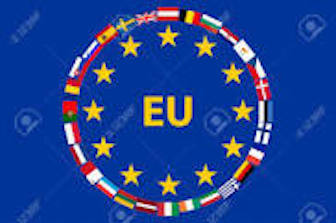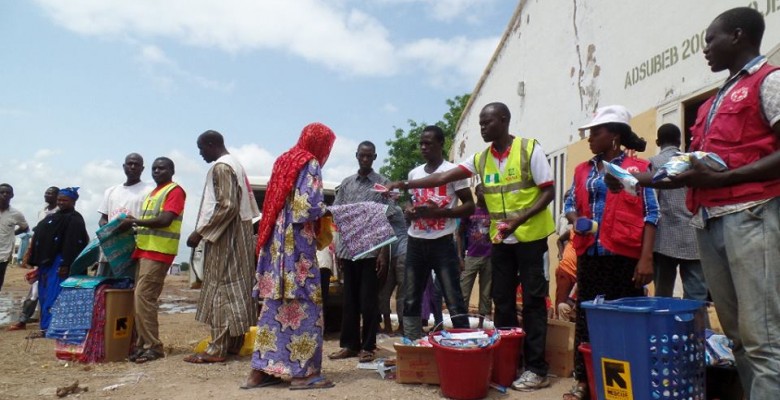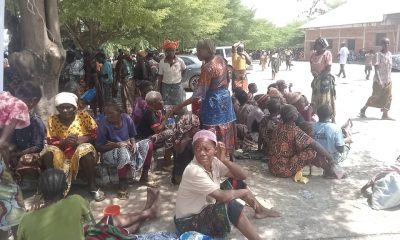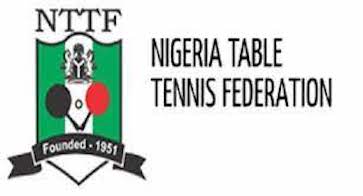Foreign News
EU Donates 2m more Doses of Covid-19 Vaccine to Nigeria

.As WHO, CommonWealth Make Case for Poor Nations
By Laide Akinboade, Abuja
The European Union (EU) has donated additional two million more doses of Johnson and Johnson, (J&J), COVID-19 vaccines to Nigeria.
The Executive Director of the National Primary Healthcare Development Agency, NPHCDA, Dr.
Faisal Shuaib, took the delivery of the vaccines during the handover ceremony, in Abuja on behalf of the Presidential Steering Committee chaired by the Secretary to the Government of the Federation Boss Mustapha.According to him, the two million doses of J&J Covid-19 vaccine donated by the European Union to Nigeria would be judiciously used for the benefit of Nigerians.
Shuaib hinted that the Federal Government of Nigeria had earlier in 2021 procured 39,850,000 doses of the Johnson & Johnson vaccine from the AFREXIM Bank through the African Union.
According to him, “With today’s donation of 1,936,050 doses by the European Union, the total number of doses of Johnson & Johnson vaccine available to Nigeria is about fifty-one million doses.
“At the moment, Nigeria currently has in-country 12,916,450 doses of the Johnson and Johnson vaccines. On behalf of the federal government of Nigeria, I want to sincerely appreciate the European Union for your continued partnership in development.
“We have no doubt about the commitment of the European Union to the eradication of COVID-19 from Nigeria and the rest of the world. The onus is upon us to make rational and effective use of the vaccines”.
He also said that the administration of the J&J vaccines will be focusing at the moment, on those who are in the hard-to-reach areas (riverine areas, desert areas and security-compromised areas).
He noted, “This is because the Johnson & Johnson vaccine requires only a single dose for full vaccination. This way our health workers will be able to do what is called a ‘touch and go’ without compromising on their safety.
“I would like to assure our partners that Nigeria is committed to a safe, equitable and effective COVID-19 vaccination program. Let me also mention that the availability of different vaccine brands does not in any way mean that some categories of people are selected for high quality vaccines while others are targeted for low quality vaccines”.
He added, “All COVID-19 vaccines approved by the World Health Organization, WHO, are safe and can deliver adequate protection against the disease. While choice of vaccine is left for eligible persons to make, it is important to note that no particular vaccine brand is preferable to the other”. He said.
NPHCDA boss stressed that Nigeria has vaccinated over fifteen million of her eligible population with the 1st dose.
“We are using the platform of COVID-19 vaccination to also make available access to other primary healthcare interventions. We have been engaging with the poor performing states to identify areas where they would require more support from us and to also help them in identifying areas where they can improve in order to ramp up their vaccination coverage. Last week, we were in Enugu State where we engaged with all the stakeholders in the 5 South East States.
“With our attention now intensively focused on the states, we are hoping to see a more rapid vaccine coverage over the next couple of weeks”. He said.
He, however, appreciated the European Union for the generosity and called on all eligible Nigerians who are yet to be vaccinated to please avail themselves of current opportunities to receive their COVID-19 vaccines.
Meanwhile, the leader of the European Union Delegation and EU Ambassador to Nigeria, Samuela Isopi, hinted that Team Europe was glad to join forces and pool together their resources to support partner countries in the common fight against the pandemic.
Isopi said, “Today’s donation brings us collectively closer to reaching the milestone of 500 million doses delivered by COVAX, with 300 million donated by Team Europe, an achievement which is worth celebrating today. The European Union is so far the biggest donor of COVID-19 vaccines in the world. To date, Team Europe has mobilised at least EUR 38.5 billion, of which €8 billion for the African continent. The EU is now stepping up its effort to support Africa, where vaccination is lower than in other parts of the world. This will be at the centre of the discussions among Africa and Europe’s leaders at the upcoming EU-AU Summit next week in Brussels”. .
She said that in 2020, Team Europe has been at the forefront of this fight and has quickly mobilized support to back the Government’s immediate response.
” As we head into the third year since the Covid-19 outbreak, the pandemic is not yet defeated. We must continue to work together, help partner countries to speed up vaccinations and to develop the capacity to manufacture vaccines locally. Until then, we need to make sure that we all continue to respect safety precautions”. Isopi added.
Similarly, the World Health Organization (WHO) Country Representative to Nigeria, Dr. Walter Mulombo, said that the additional vaccines donated by the EU is safe.
“As the only single-dose COVID-19 vaccine approved for use till date, the vaccines may be an important tool for accessing difficult terrains and population. These vaccines are safe and effective and will be the game-changer”. Mutombo said.
He stated that the WHO will continue to support countries to reach their vaccination targets.
“As I mentioned previously, vaccines are a critical tool in the battle against COVID-19. These vaccines are safe and effective and will be the game – changer: but for the foreseeable future, we must continue wearing masks, physically distance and avoid crowds.
We can end the acute phase of the pandemic this year, we can end COVID-19 as a global health emergency, and we can do it this year with observance of public health measures and increased vaccination coverage remain our best defense against another surge. WHO is constantly analysing data as we receive them and working closely with relevant government agencies to use the data to help inform, initiate, and implement response actions, as well new policies, and strategies at National, State and LGA levels”. Mulombo said.
Also, the UNICEF Representative in Nigeria, Dr. Peter Hawkins, hinted that the latest donation would help Nigeria to plan and manage the available vaccines effectively.
He, however, called on all donors to invest in the immunisation system and primary healthcare structure for quick response to accelerate vaccine-derived diseases.
He also pointed out that the two-year life span of the vaccines gives the Nigerian government enough time to get to people in hard-to-reach areas.
In a related development, the World Health Organisation (WHO) and Commonwealth of Nations have jointly pleaded for vulnerable small states to get better access to Covid-19 jabs to help revive their economies.
WHO Chief, Tedros Adhanom Ghebreyesus and Commonwealth Head, Patricia Scotland met at the UN health agency’s headquarters in Geneva to sign an agreement focused on ending the pandemic and combating vaccine inequity.
“The impact of the pandemic will be felt for decades, especially among the most vulnerable,” Tedros said.
“The longer the pandemic drags on, the worse those impacts will be.”
The WHO wants 70 percent of the population in each country fully vaccinated by the end of June.
Tedros said that so far, 42 percent of Commonwealth citizens had been fully vaccinated — but only 23 percent across its African member states.
Scotland noted that 32 of the world’s 42 small states are in the Commonwealth.
At current global vaccination rates, we could vaccinate the entire population of these states within two or three days,” she said.
Born out of the British empire, the Commonwealth brings together around a quarter of the world’s countries and a third of the world’s population.
“Equitable access to vaccines, especially for small and vulnerable countries, is the most pressing political, economic, social and moral priority,” Scotland said.
Besides the pandemic, the WHO-Commonwealth memorandum of understanding focused on promoting universal health coverage and primary health care, strengthening health security and exchanging innovation and knowledge.
The Commonwealth includes developed nations such as Britain, Canada and Australia, along with emerging economies like India, Nigeria and Malaysia and small island states such as Tuvalu and Barbados.
Foreign News
Zelensky Announces New Draft Law on Anti-corruption Bodies after Protests

Ukrainian President Volodymyr Zelensky said he has approved the text of a draft law guaranteeing the freedom of two anti-corruption bodies in Ukraine – days after nationwide protests broke out over changes curbing their independence.
Kyiv’s Western partners had also expressed serious concerns over the legislation.
On Thursday, Zelensky seemed to backtrack, saying the new bill was intended to safeguard the independence of Ukraine’s National Anti-Corruption Bureau (Nabu) and Specialised Anti-Corruption Prosecutor’s Office (Sap), and to protect them from Russian influence.
He said the text of the bill was “balanced”, but did not provide any details.
The law passed earlier this week brought Nabu and Sap under the control of the prosecutor general, who is appointed by the president.
At the time Zelensky justified his decision to curtail the bodies’ powers by citing Russian influence. The day before, Ukraine’s security services had carried out searches and arrests targeting alleged Russian spies at the agency.
The passing of the legislation instantly sparked the largest protests since the start of Russia’s full-scale invasion in February 2022 in several cities across Ukraine, with many worrying the law would severely undermine the Nabu and Sap’s authority and effectiveness.
Thousands of people gathered in streets and squares across Ukraine, holding placards calling for the legislation to be vetoed.
Several commentators accused Zelensky of democratic backsliding. Their concerns were further exacerbated when Ukraine’s Western partners signalled their displeasure with the bill.
Ukraine has official EU candidate status and a spokesman for European Commission chief Ursula von der Leyen previously warned Kyiv that the rule of law and the fight against corruption were “core elements” of membership to the bloc.
On Thursday, the Commission said it “welcomed” the Ukrainian government’s decision to take action against the bill.
“We are working [with the Ukrainian government] to make sure that our concerns… are indeed taken into account,” the spokesman said.
Nabu and Sap were created in 2014-15 as one of the requirements set by the European Commission and International Monetary Fund to move towards a relaxation of visa restrictions between Ukraine and the EU.
Writing on Facebook, opposition MP Oleksiy Goncharenko noted Zelensky said that “the independence of anti-corruption institutions must be guaranteed.”
“First we take it away, and then we say that it must be guaranteed. So why was all this necessary?”
In his message on social media on Thursday, Zelensky did not acknowledge the protests or the backlash but said it was “important that we respect the position of all Ukrainians and are grateful to everyone who stands with Ukraine.”
Foreign News
US Senators Exempt HIV/Aids Funding from Planned Spending Cuts

Republicans in the US Senate have said they will spare the US-backed HIV/Aids programme Pepfar from cuts, amid a larger effort to reduce government spending.
Senators said they would end a plan to cut $400m (£300m) from the President’s Emergency Plan for Aids Relief programme, leaving total proposed cuts at $9bn.
The proposition was made in a Senate amendment to a rescissions package – meaning a bill that allows lawmakers to cancel previous funding approved by Congress.
The planned cancellations also include funds for international aid and public broadcasting.If the Pepfar amendment is approved, the bill will go back to the House of Representatives for another vote ahead of a Friday deadline.
Multiple senators from both parties had expressed concern with cuts to Pepfar, which was launched under President George W Bush and has been credited with saving tens of millions of lives around the world.
The Republican-controlled Senate can only afford a few defectors, assuming all Democrats vote in opposition. John Thune, the Republican Senate majority leader, said there had been a “lot of interest” in keeping the Pepfar funding intact.
Senator Susan Collins, a Republican from Maine, told reporters after a White House lunch on Tuesday that she was “very pleased” that the cuts would be removed.
Prior to the amendment, Collins had been vocal against the bill. She has not said whether the changes are enough to secure her support.
Office of Management and Budget (OMB) Director Russell Vought told reporters that the White House was on board with the Senate amendment, meaning that in its current form President Donald Trump would be willing to sign it.
In his second presidency, Trump has turbo-charged an effort to reduce government spending. Most of the cuts in the rescission bill are aimed at clawing back money that was previously earmarked for the American government’s main humanitarian assistance body, USAID, which recently announced its formal closure under Trump.
Trump’s moves have led to drastic reductions in HIV/Aids clinics in South Africa and other countries, precipitating a shortage of life-saving medicine and care.
Other cuts in the rescission bill are aimed at the funding for public broadcasters NPR and PBS.
Foreign News
WHO Commends Senegal for Eliminating Trachoma

The World Health Organization (WHO) has validated Senegal’s elimination of trachoma as a public health problem, making it the ninth country in WHO’s African Region to have achieved the feat.
WHO Director-General Tedros Ghebreyesus, in a statement, lauded the country for freeing its population of the disease.
“This milestone is yet another sign of the remarkable progress being made against neglected tropical diseases globally, and offers hope to other countries still working to eliminate trachoma.
”Trachoma has been known in Senegal since the early 1900s and was confirmed as a major cause of blindness through surveys in the 1980s and 1990s.
Senegal joined the WHO Alliance for the Global Elimination of Trachoma in 1998, conducted its first national survey in 2000, and completed full disease mapping by 2017 with support from the Global Trachoma Mapping Project and Tropical Data.
Trachoma control was consistently integrated into national eye health programmes – first under the National Programme for Blindness Prevention (PNLC) and later through the National Programme for the Promotion of Eye Health (PNPSO).
The country’s consistent integration of trachoma control into its national eye health programmes positioned it to significantly maintain its commitment to the elimination of the disease.
“Today we celebrate our victory against trachoma, 21 years after the one against dracunculiasis”, Dr Ibrahima Sy, Senegal’s Minister of Health and Social Action, said.
“This new milestone reminds us that our overarching goal remains a Senegal free from neglected tropical diseases.
“We are fully committed to this, and we are making good progress, notably against human African trypanosomiasis (sleeping sickness) and onchocerciasis”.
Senegal implemented the WHO-recommended SAFE strategy to eliminate trachoma with the support of partners, reaching 2.8 million people who needed them across 24 districts.
These activities included the provision of surgery to treat the late blinding stage of the disease and conducting antibiotic mass drug administration of azithromycin donated by Pfizer through the International Trachoma Initiative.
Similarly, public awareness campaigns were carried out to promote facial cleanliness and improvement in access to water supply and sanitation.
Trachoma is the second neglected tropical disease to be eliminated in Senegal. In 2004, the country was certified free of dracunculiasis (Guinea-worm disease) transmission.
Senegal now joins 24 other countries that have been validated by WHO for eliminating trachoma.
The 24 countries are Benin, Burundi, Cambodia, China, Gambia, Islamic Republic of Iran, Lao People’s Democratic Republic, Ghana, India, Iraq, Malawi, and Mali.
The others are Mauritania, Mexico, Morocco, Myanmar, Nepal, Oman, Pakistan, Papua New Guinea, Saudi Arabia, Togo, Vanuatu, and Vietnam.
These countries are part of a wider group of 57 countries that have eliminated one or more neglected tropical diseases.
WHO is supporting Senegal’s health authorities to closely monitor communities in which trachoma was previously endemic, to ensure there is no resurgence of the disease.
“Trachoma has cast a shadow over communities in Senegal for more than a century.
“This long-awaited validation is not only a milestone for public health but a powerful tribute to the tireless dedication of frontline health workers, communities, government leaders, and partners who never gave up,” Dr. Jean-Marie Vianny Yameogo, WHO Representative in Senegal, said.
“Today, we close a chapter that began over a hundred years ago, united with pride, gratitude and resolve. WHO remains committed to supporting Senegal as the country continues to lead in sustaining this hard-earned achievement.”
Trachoma remains a public health problem in 32 countries, with an estimated 103 million people living in areas requiring interventions against the disease.
Trachoma is found mainly in the poorest and most rural areas of Africa, Central and South America, Asia, the Western Pacific and the Middle East.
WHO’s African Region is disproportionately affected by trachoma, with 93 million people living in at-risk areas in April 2024, representing 90% of the global trachoma burden.
Significant progress has been made in the fight against trachoma over the past few years, and the number of people requiring antibiotic treatment for trachoma in the African Region fell by 96 million from 189 million in 2014 to 93 million as of April 2024, representing a 51 percent reduction.
There are currently 20 countries in WHO’s African Region that are known to require intervention for trachoma elimination.
They are Algeria, Angola, Burkina Faso, Cameroon, Central Africa Republic, Chad, Côte d’Ivoire, Democratic Republic of the Congo, Eritrea, Ethiopia, and Guinea.
The others are Kenya, Mozambique, Niger, Nigeria, South Sudan, the United Republic of Tanzania, Uganda, Zambia, and Zimbabwe.
A further 3 countries in the Region (Botswana, Guinea-Bissau and Namibia) claim to have achieved the prevalence targets for elimination.

























